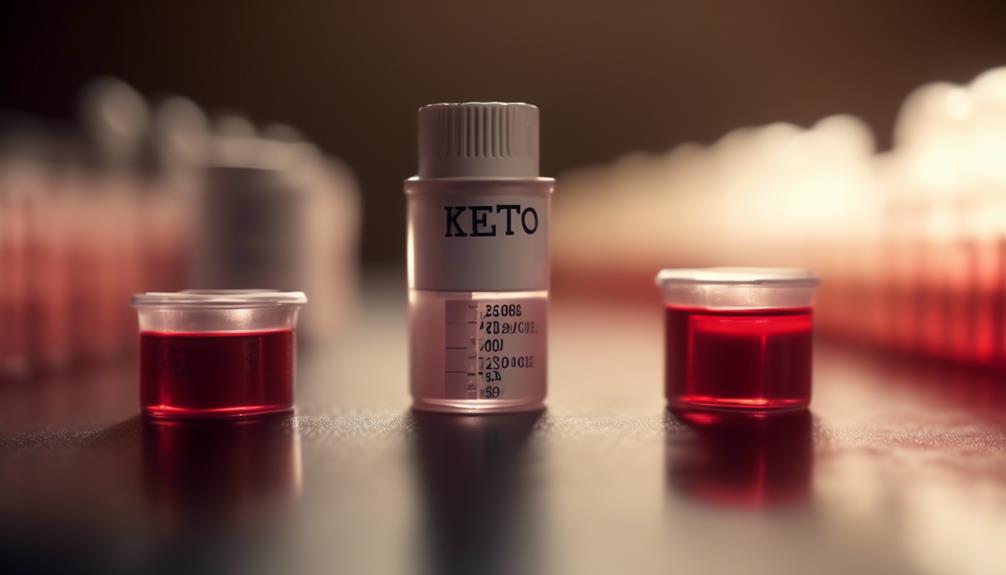Like a key that unlocks a hidden treasure, the link between keto and improved cholesterol holds the promise of a healthier heart and a stronger body. You may have heard whispers of this connection, but now it's time to uncover the truth behind the whispers.
How does the ketogenic diet affect your cholesterol levels? Can it truly make a positive impact on your heart health? In this discussion, we will explore the science behind the keto diet and cholesterol, unravel the mysteries of LDL and HDL cholesterol, and discover the potential benefits and risks of keto for your cholesterol.
Prepare to embark on a journey of knowledge and understanding, where the secrets of a healthy heart await.
The Basics of Keto

If you're interested in understanding the fundamentals of the ketogenic diet, let's dive into the basics of keto.
The ketogenic diet, or keto for short, is a low-carbohydrate, high-fat diet that has gained popularity for its potential benefits in weight loss and overall health.
The main idea behind keto is to shift your body into a state of ketosis, where it primarily uses fat for fuel instead of carbohydrates. By drastically reducing your carbohydrate intake and increasing your fat intake, your body begins to produce ketones, which are molecules that are used as an alternative energy source.
While the basics of keto may seem straightforward, it's important to note that this diet isn't without its potential health risks.
One of the main concerns is the potential for nutrient deficiencies due to the limited variety of foods allowed on the diet. Since carbohydrates are restricted, it can be challenging to meet your daily requirements for certain vitamins and minerals.
Additionally, the high intake of saturated fats in a keto diet may increase the risk of heart disease and other cardiovascular conditions.
It's important to approach the ketogenic diet with caution and consult with a healthcare professional to ensure that you're meeting your nutritional needs and minimizing any potential health risks.
Understanding Cholesterol Levels
Now, let's talk about understanding cholesterol levels.
Cholesterol is a waxy substance found in your blood that's needed for various bodily functions. It's classified into two types: LDL (often referred to as 'bad' cholesterol) and HDL (known as 'good' cholesterol).
The impact of following a keto diet on cholesterol levels is a topic of interest and we'll explore it further.
Cholesterol Basics
Understanding cholesterol levels is crucial for gaining insights into your overall cardiovascular health. Cholesterol is a waxy substance that's produced by your body and also found in certain foods. It plays a vital role in various bodily functions, such as hormone production and cell membrane maintenance.
When it comes to cholesterol management, it's important to focus on two types: LDL (low-density lipoprotein) and HDL (high-density lipoprotein). LDL cholesterol is often referred to as 'bad' cholesterol because it can build up in your arteries and increase the risk of heart disease. HDL cholesterol, on the other hand, is considered 'good' cholesterol as it helps remove LDL cholesterol from your bloodstream.
While dietary impact on cholesterol levels can vary from person to person, it's generally recommended to limit saturated and trans fats, as they can raise LDL cholesterol levels. Instead, opt for healthy fats, such as those found in avocados, nuts, and olive oil, which can increase HDL cholesterol levels.
Regular exercise and maintaining a healthy weight are also important factors in cholesterol management. By understanding cholesterol levels and making appropriate dietary and lifestyle choices, you can improve your overall cardiovascular health.
Impact of Keto
To further explore the impact of the ketogenic diet on cholesterol levels, let's dive into how this dietary approach affects your overall cardiovascular health.
One of the primary goals of the keto diet is to promote weight loss, and studies have shown that it can have a positive impact on weight reduction. By reducing carbohydrate intake and increasing fat consumption, the body enters a state of ketosis, where it starts using fat for fuel instead of carbohydrates. This can lead to significant weight loss, which in turn can have a positive effect on cholesterol levels.
Additionally, the long-term effects of the keto diet on cholesterol levels are promising. Several studies have found that the keto diet can lead to a reduction in LDL cholesterol, which is often referred to as the 'bad' cholesterol. However, it's important to note that more research is needed to fully understand the long-term effects of the keto diet on cholesterol levels.
The Science Behind Keto and Cholesterol

The ketogenic diet has been extensively studied for its impact on cholesterol levels, revealing promising results. One of the key factors in the keto diet is the role of dietary fat. It's often believed that consuming high amounts of fat can lead to an increase in cholesterol levels. However, research has shown that the type of fat consumed is more important than the amount. The keto diet emphasizes healthy fats such as avocados, nuts, and olive oil, which have been shown to have a positive effect on cholesterol.
The metabolic effects of the keto diet on cholesterol are also worth noting. When you follow a ketogenic diet, your body enters a state of ketosis, where it primarily uses fat for energy instead of carbohydrates. This can lead to a decrease in triglyceride levels, a type of fat found in the blood that's associated with an increased risk of heart disease.
Additionally, the keto diet has been found to increase levels of HDL cholesterol, often referred to as the 'good' cholesterol, which helps remove LDL cholesterol from the arteries.
Impact of Keto on LDL Cholesterol
When it comes to the impact of keto on LDL cholesterol, there are several important points to consider.
First, research has shown that following a keto diet can lead to a reduction in LDL cholesterol levels. This is significant because high levels of LDL cholesterol are associated with an increased risk of heart disease. Therefore, adopting a keto diet may have positive benefits for heart health.
LDL Cholesterol Reduction
Reducing LDL cholesterol levels is a notable effect of following a ketogenic diet. Here are three ways in which the keto diet can help lower LDL cholesterol:
- Increased consumption of healthy fats: The keto diet promotes the intake of healthy fats like avocados, nuts, and olive oil. These fats have been shown to increase HDL cholesterol (the 'good' cholesterol) while reducing LDL cholesterol.
- Reduced intake of refined carbohydrates: The keto diet restricts the consumption of refined carbohydrates, such as sugar and white flour. These foods can raise LDL cholesterol levels. By eliminating them from your diet, you can help lower your LDL cholesterol levels.
- Weight loss: The keto diet can lead to significant weight loss, which is associated with improved cholesterol levels. Losing excess weight can help lower LDL cholesterol and increase HDL cholesterol.
Keto Diet Benefits
By following a ketogenic diet, you can experience several benefits that positively impact your LDL cholesterol levels.
One of the main benefits is weight loss. The keto diet promotes the consumption of high-fat foods and restricts carbohydrates, which can lead to significant weight loss. Studies have shown that weight loss itself can improve LDL cholesterol levels by reducing the number of LDL particles in the bloodstream.
Additionally, the keto diet has been found to regulate blood sugar levels. By limiting carbohydrate intake, the body relies on fat for energy, reducing the need for insulin production. This can help stabilize blood sugar levels and reduce the risk of developing conditions such as insulin resistance and type 2 diabetes, which can negatively affect LDL cholesterol.
Impact on Heart Health
The impact of the keto diet on LDL cholesterol levels can have a significant effect on heart health. Here are three important points to consider:
- Lower LDL cholesterol levels: The keto diet has been shown to reduce levels of LDL cholesterol, which is commonly referred to as 'bad' cholesterol. This is beneficial for heart health, as high levels of LDL cholesterol are associated with an increased risk of heart disease.
- Improvement in blood pressure: Research suggests that following a keto diet may help lower blood pressure levels. High blood pressure is a major risk factor for heart disease, and reducing it can have a positive impact on heart health.
- Reduced inflammation: The keto diet has been found to decrease markers of inflammation in the body. Chronic inflammation is linked to the development of heart disease, and by reducing inflammation, the keto diet may help protect against cardiovascular problems.
Effect of Keto on HDL Cholesterol
Increasing your intake of healthy fats on a keto diet has been shown to positively impact HDL cholesterol levels, which is beneficial for cardiovascular health. HDL cholesterol, often referred to as the 'good' cholesterol, plays a crucial role in removing excess cholesterol from the bloodstream and transporting it back to the liver for processing and elimination.
Studies have shown that following a keto diet can lead to an increase in HDL cholesterol levels. This is thought to be due to the high consumption of healthy fats like avocados, nuts, and olive oil, which are staples of the keto diet. These fats are rich in monounsaturated and polyunsaturated fats, which have been shown to raise HDL cholesterol levels.
One study published in the Journal of the American College of Cardiology found that individuals following a low-carbohydrate, high-fat diet experienced a significant increase in HDL cholesterol levels compared to those on a low-fat diet.
Another study published in the journal Nutrition & Metabolism found that participants on a ketogenic diet saw a 15% increase in HDL cholesterol levels after 12 weeks.
Keto and Triglyceride Levels

As you continue exploring the effects of the keto diet on cholesterol, it's important to consider its impact on triglyceride levels. Triglycerides are a type of fat found in your blood, and high levels of triglycerides are associated with an increased risk of cardiovascular disease.
The good news is that the keto diet has been shown to have a positive effect on triglyceride levels. Here are three key ways in which the keto diet can improve your lipid profile and overall cardiovascular health:
- Reduction in triglyceride levels: Studies have found that following a keto diet can lead to a significant decrease in triglyceride levels. This is thought to be due to the low-carbohydrate nature of the diet, which helps to lower the production of triglycerides in the liver.
- Increase in HDL cholesterol: HDL cholesterol, often referred to as 'good' cholesterol, plays a crucial role in removing excess cholesterol from the bloodstream. The keto diet has been shown to increase HDL cholesterol levels, which can further help to lower triglyceride levels.
- Decrease in LDL cholesterol: While the keto diet can increase HDL cholesterol, it has also been found to decrease LDL cholesterol, or 'bad' cholesterol. High levels of LDL cholesterol are a risk factor for cardiovascular disease, so the reduction seen with the keto diet is beneficial for overall cardiovascular health.
Does Keto Improve Cholesterol Ratios?
Improving cholesterol ratios is a potential benefit of following the keto diet. When it comes to cholesterol, it's not just about the total levels but also the ratio between different types of cholesterol. The keto diet has been shown to have a positive impact on these ratios, particularly by reducing levels of LDL cholesterol, also known as 'bad' cholesterol.
Studies have found that the keto diet can lead to significant reductions in LDL cholesterol levels. One study published in the journal Nutrients found that participants following a keto diet experienced a decrease in LDL cholesterol levels by an average of 15.6%. Another study published in the journal Nutrition & Metabolism showed that the keto diet resulted in a decrease in LDL cholesterol levels by an average of 20.6%.
Improving cholesterol ratios is important for heart health as it can help reduce the risk of cardiovascular diseases. High levels of LDL cholesterol are associated with an increased risk of heart disease, while higher levels of HDL cholesterol, also known as 'good' cholesterol, are associated with a reduced risk.
Potential Benefits of Keto on Heart Health

The keto diet's positive impact on cholesterol ratios extends to potential benefits for heart health. While more research is needed to fully understand the long-term effects, there are several potential advantages that make the keto diet a promising approach for heart health. Here are three key benefits to consider:
- Weight loss: The keto diet, with its focus on high-fat and low-carb foods, has been shown to promote weight loss. Excess weight is a known risk factor for heart disease, and shedding those extra pounds can help improve heart health by reducing blood pressure and cholesterol levels.
- Reduced inflammation: Chronic inflammation is linked to the development of heart disease. The keto diet has been found to reduce markers of inflammation in the body. By minimizing inflammation, the diet may help protect against heart disease and improve overall cardiovascular health.
- Lower triglyceride levels: Triglycerides are a type of fat that can accumulate in the blood and contribute to heart disease. Studies have shown that the keto diet can significantly reduce triglyceride levels, which is an important marker for heart health.
It's important to note that while the potential benefits of the keto diet on heart health are promising, there may be potential risks and long-term effects that need further investigation. As with any dietary approach, it's advisable to consult with a healthcare professional before making any significant changes to your diet.
Considerations and Risks of Keto for Cholesterol
Considerations and risks should be taken into account when following the keto diet for cholesterol management. While the keto diet has shown promise in improving cholesterol levels, there are some factors to consider before adopting this eating plan.
One consideration is the potential increase in LDL cholesterol, also known as 'bad' cholesterol. Some studies have found that the keto diet can lead to elevated LDL levels in certain individuals. However, it's important to note that not everyone experiences this effect, and the increase in LDL may be temporary.
Another risk to consider is the potential for nutrient deficiencies. The keto diet is highly restrictive and eliminates many food groups, including fruits, whole grains, and legumes. These foods are important sources of vitamins, minerals, and fiber. Therefore, it's crucial to carefully plan meals to ensure adequate nutrient intake.
Furthermore, the keto diet may not be suitable for everyone, especially those with certain medical conditions. People with liver or pancreatic diseases, for example, may need to avoid the high fat content of the diet. Additionally, individuals with a history of disordered eating or who struggle with restrictive eating patterns should approach the keto diet with caution.
Conclusion
In conclusion, the ketogenic diet has been found to have a positive impact on cholesterol levels. Studies have shown that it can increase HDL (good) cholesterol and decrease LDL (bad) cholesterol and triglyceride levels.
One interesting statistic to note is that a study found that following a keto diet for 12 weeks led to a 12% decrease in LDL cholesterol levels. This suggests that the keto diet may be a beneficial approach for improving cholesterol levels and promoting heart health.







